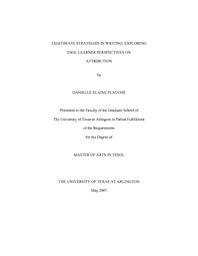
ATTENTION: The works hosted here are being migrated to a new repository that will consolidate resources, improve discoverability, and better show UTA's research impact on the global community. We will update authors as the migration progresses. Please see MavMatrix for more information.
Show simple item record
| dc.contributor.author | Plauche, Danielle Elaine | en_US |
| dc.date.accessioned | 2007-08-23T01:56:13Z | |
| dc.date.available | 2007-08-23T01:56:13Z | |
| dc.date.issued | 2007-08-23T01:56:13Z | |
| dc.date.submitted | December 2006 | en_US |
| dc.identifier.other | DISS-1609 | en_US |
| dc.identifier.uri | http://hdl.handle.net/10106/172 | |
| dc.description.abstract | In many academic institutions today, ESOL (English as a Second or Other Language) writers may incorporate background sources into their writing in ways unrecognized by their academic institutions, which could lead to these learners' academic success or failure. In recent years, researchers and teachers alike have sought to understand the ways ESOL writers understand and avoid plagiarism in many academic institutions. Yet there is little research which explores the perspectives of ESOL writers regarding strategies that are used to attribute authorship. The following study explores the strategies that eight ESOL writers in four different pre-academic proficiency levels use to attribute authorship and their perspectives regarding when they believe such strategies should be used. In this light, I address the following research questions: (1)In what ways do ESOL writers use strategies to attribute authorship to source texts in three writing tasks? (2)What are these learners' perspectives regarding the use of such strategies for? (3)To what extent do these learners' use of and perspectives on these strategies compare to these learners' academic institution? Three writing tasks are explored: an initial interview-report writing task, a reading-to-write writing task, and a follow-up interview-report writing task. Results suggest that these learners have common perspectives regarding attribution which are similar in some ways and dissimilar in others to their academic institutions. Results also suggest that regardless of task type, instruction, proficiency level, culture, language, and a multitude of individual differences that could shape the strategies ESOL writers use to attribute authorship, explicit instruction and facilitated learner practice may be the most effective methods of helping ESOL writers transition towards using recognized strategies for attribution to avoid plagiarism. | en_US |
| dc.description.sponsorship | Ouellette, Mark A. | en_US |
| dc.language.iso | EN | en_US |
| dc.publisher | Humanities | en_US |
| dc.title | Legitimate Strategies In Writing : Exploring ESOL Learner Perspectives On Attribution | en_US |
| dc.type | M.A. | en_US |
| dc.contributor.committeeChair | Ouellette, Mark A. | en_US |
| dc.degree.department | Humanities | en_US |
| dc.degree.discipline | Humanities | en_US |
| dc.degree.grantor | University of Texas at Arlington | en_US |
| dc.degree.level | masters | en_US |
| dc.degree.name | M.A. | en_US |
| dc.identifier.externalLink | https://www.uta.edu/ra/real/editprofile.php?onlyview=1&pid=1560 | |
| dc.identifier.externalLinkDescription | Link to Research Profiles | |
Files in this item
- Name:
- umi-uta-1609.pdf
- Size:
- 177.5Kb
- Format:
- PDF
This item appears in the following Collection(s)
Show simple item record


